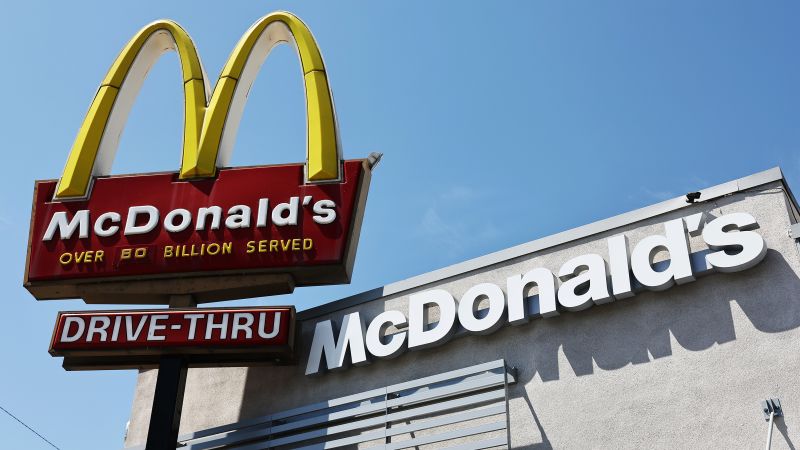Donald Trump and McDonald’s: A Political Fast-Food Showdown
In the final days of his third presidential campaign, Donald Trump has taken an unexpected turn by pulling one of America’s most iconic brands, McDonald’s, into the political arena. This move is not just a publicity stunt; it’s a strategic play that intertwines fast food with political narratives, showcasing how even the most mundane aspects of life can become fodder for political discourse.
A Fry Cook in Pennsylvania
During a recent campaign stop in Pennsylvania, Trump donned an apron and stepped behind the counter at a local McDonald’s franchise. This was not just a photo op; he actively participated in serving food, even claiming to have made it himself. The restaurant was closed for the event, allowing Trump to engage with customers in a unique way, telling them, “It’s all on me.” This hands-on approach was reminiscent of the working-class roots that many politicians, including his opponent Kamala Harris, often highlight in their narratives.
The McDonald’s Connection to Kamala Harris
Trump’s visit to McDonald’s was not merely a whimsical choice; it was a direct jab at Vice President Kamala Harris, who has often referenced her time working at a McDonald’s during her youth. Harris has shared that she worked at a McDonald’s in Alameda, California, during the summer of 1983 while attending Howard University. This detail has become a cornerstone of her middle-class origin story, contrasting sharply with Trump’s affluent upbringing.
Trump has seized upon this aspect of Harris’s biography, frequently questioning the authenticity of her claims. He has accused her of fabricating her work history at the fast-food chain, despite no evidence to support his assertions. “I’m looking for a job,” Trump quipped to the McDonald’s owner during his visit, further emphasizing his narrative that Harris’s story is “totally phony.”
A Battle of Narratives
The political landscape is often shaped by personal stories, and both Trump and Harris are leveraging their backgrounds to connect with voters. Harris’s experience at McDonald’s is often highlighted by her supporters as a testament to her hard work and dedication. In contrast, Trump’s attacks aim to undermine her credibility, suggesting that her working-class narrative is a fabrication.
Harris has largely ignored Trump’s provocations, choosing instead to focus on her campaign message. Her campaign has confirmed her employment at McDonald’s, stating that she worked both the register and the fry machine. This detail has been reiterated in various forums, including her appearances on talk shows where she has discussed her time at the fast-food giant.
Trump’s Fast-Food Affection
Trump’s affinity for fast food is well-documented, and he has often expressed his love for McDonald’s and other chains. His preference for fast food has been a recurring theme throughout his public life, even extending into his presidency. From serving fast food to sports teams at the White House to joking about his knowledge of the McDonald’s menu, Trump has made no secret of his fondness for these establishments.
In a 2016 CNN town hall, he remarked on the quality control of fast food, suggesting that it was a safer choice than other dining options. This perspective has allowed him to position himself as relatable to everyday Americans who enjoy the convenience and familiarity of fast food.
The Political Implications
The implications of Trump’s McDonald’s visit extend beyond mere campaign theatrics. It highlights the ongoing battle for the working-class vote, a demographic that both candidates are keen to attract. By engaging with a recognizable brand like McDonald’s, Trump aims to resonate with voters who may feel a connection to the fast-food experience.
Moreover, Trump’s focus on Harris’s employment history reflects a broader strategy of questioning the authenticity of his opponents. This tactic has been a hallmark of his political style, as seen in his previous campaigns where he often targeted the personal narratives of his rivals.
The Role of Media and Public Perception
Media coverage of Trump’s McDonald’s visit has amplified the narrative, drawing attention to the contrasting backgrounds of the two candidates. As the election approaches, these stories will likely continue to shape public perception. The interplay between fast food and politics serves as a reminder of how personal experiences can be weaponized in the political arena.
In a world where every detail can be scrutinized and turned into a talking point, the connection between Trump, Harris, and McDonald’s exemplifies the complexities of modern political campaigning. The fast-food chain, often seen as a symbol of American culture, has become an unlikely battleground for two very different visions of leadership and authenticity.
As the election draws near, the stakes are high, and the narratives surrounding candidates will only intensify, making every fry served and every burger flipped a potential political statement.
